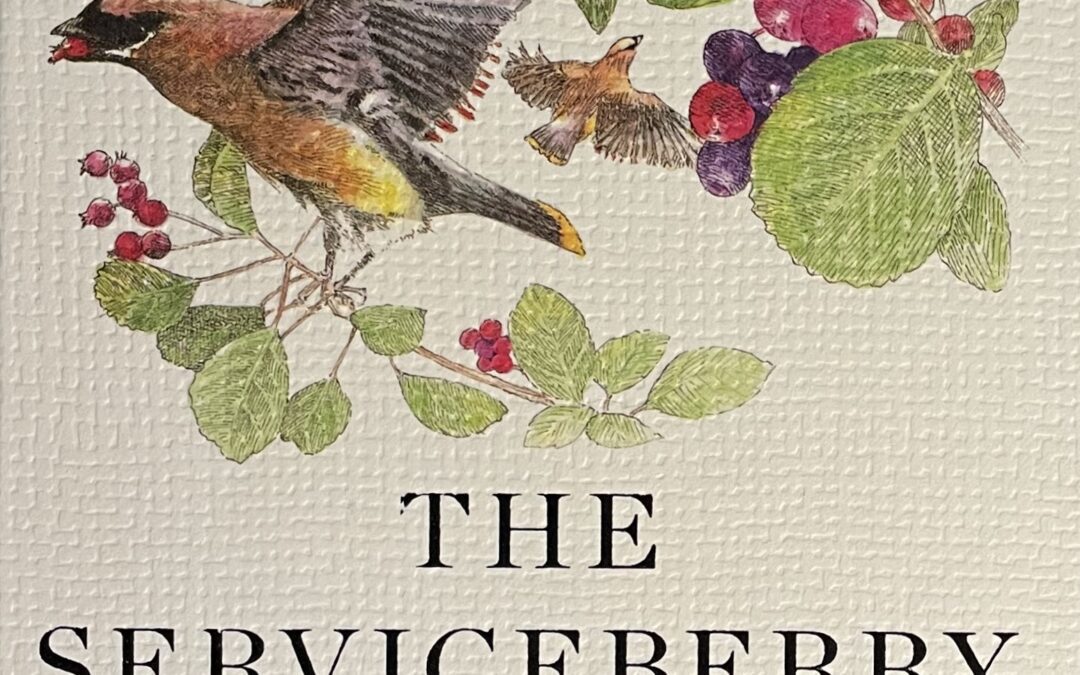Book cover, The Serviceberry (John Burgoyne, illustrator)
I am always on the search for contemporary books addressing themes covered by Seton. For him, the realm of Nature is not only biological but also existing as a moral universe. Another facet of Nature is economics. Dr. Robin Wall Kimmerer has comments on both in The Serviceberry, Abundance and Reciprocity in the Natural World. (Scribner, 2024)
In his 1927 essay “A Lament” (Lives of Game Animals) Seton took a pessimistic view about our chances of long-term survival should we continue our destructiveness towards nature. For him, this was a moral crisis. One can only imagine how horrified he would be at today’s world where the challenges to biodiversity have grown exponentially.
In The Serviceberry Dr. Kimmerer discusses issues in terms derived from her work in plant ecology. In the first round of ecological succession plant colonists “consume resources, crowd out others, and reproduce like crazy” until they outgrow available resources, behavior that “facilitates their own replacement.” (Pg. 99.) By analogy she is talking about the America of our time. “The extractive practices of the colonists must be replaced with reciprocity and replenishment if anyone is to survive.” (Pg. 100.)
Cutthroat Capitalism
Placing all our survival chances on the “cutthroat” capitalist system is not likely to work out all that well. Dr. Kimmerer explains economics through her magisterial account of the plant world. Basing his work on animal studies, Seton makes precisely this same point. Capitalism is the bringer of scarcity and the means (for some) to overcome the problem of “not enough.” See Thomas Piketty’s Capital if you have some extra time, or for a more enjoyable foray into economics, try The Serviceberry. Seton’s critique is even shorter: “Our system has broken down…Wherever pushed to a logical conclusion, it makes one millionaire and a million paupers. There is no complete happiness under its blight.” (The Gospel of the Redman, 1936, Pg. 107) Dr. Kimmerer’s work seems of similar sentiment.
Rather than referring to all things that come from the earth as resources or commodities, think of them as gifts. Where possible, as a replacement for cash, gifts foster a currency of gratitude and reciprocity. In a gift economy “status is determined not by how much one accumulates, but by how much one gives away.” (Pg. 32, Serviceberry; Pg. 14, Gospel.) Seton gives criteria for judging the moral standing of a society (although he used the terms “system” and “Civilization”). Written as a series of questions, his point is to compare indigenous practices with those of capitalism. He proposes that the value goods of a particular society should emphasize happiness, justice, relief of suffering, and human rights.
Socialist Sensitivity
He adds that setting a large value on kindness and discouraging “large material possessions in one man” is necessary to achieve all this. He asks, “Does your system provide for the sick, the helpless, the weak, the old and the stranger?” (Pg. 107 Gospel.) What is this if not a list of moral imperatives? All of them (and more) find a place in Dr. Kimmerer’s work under the heading of “Honorable Harvest.” (Pg. 64-65 Serviceberry.)
Dr. Kimmerer asks, “When an economic system actively destroys what we love, isn’t it time for a different system?” (Pg. 18.) This question is what drives Seton in Gospel. It is in a sense a practical question—but it is one with spiritual and moral components Seton would recognize.

